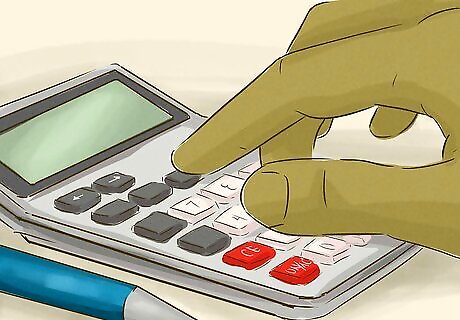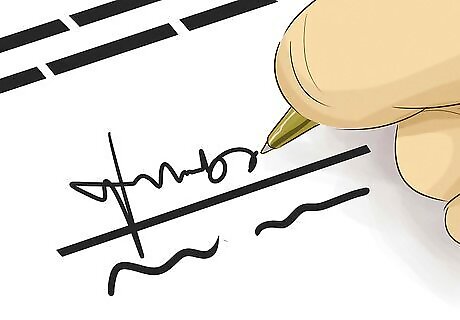
views
X
Trustworthy Source
U.S. Securities and Exchange Commission
Independent U.S. government agency responsible for regulating the securities industry, which includes stocks and options exchanges
Go to source
Calculating Your Net Worth

Total your annual income for the past two years. If you have made over $200,000 in each of the past two years, you may be eligible to become an accredited investor. You also must certify that you will make at least that much in the next year.https://www.wikihow.com/Become-an-Accredited-Investor If you are married and you and your spouse want to invest as a couple, you must have a combined income of at least $300,000 a year. This method of becoming an accredited investor is the easiest. However, since IRS tax documents are used to verify income, this method may not be available for anyone who is not a US taxpayer. Companies issuing stock have the option of using foreign tax returns provided the country imposes penalties similar to those in the US if you report false information.

Add up the value of your assets for net worth qualification. While income is the easiest way to qualify as an accredited investor, this method may not be available to you. If you don't meet the income requirements for whatever reason, you can still qualify if you have assets worth at least $1 million. The value of your primary residence does not count toward the $1 million. However, if you own vacation homes or other real property, those do count. Other assets include vehicles, bank accounts, retirement accounts, and any other investments you have.

Subtract the amount of your liabilities. The total value of your assets is discounted by any debts you have. These may include student loans, car loans, and credit card bills. Mortgages on real property also are considered liabilities. If you have a mortgage on your primary residence, it generally is not included as a liability since you can't include the value of that property as an asset. However, a portion of it may be subtracted from your net worth as a liability if you owe more than the fair market value of your home, or if you've recently taken out a home equity line of credit.

Arrive at your net worth. For purposes of becoming an accredited investor, your net worth is the total value of your assets minus the total amount of your liabilities. To qualify as an accredited investor, this amount must be more than $1 million. If you're close to the threshold and still want to become an accredited investor, talk to an attorney who specializes in security law to learn more about your options.

Take exchange rates into account. The SEC's rules require that accredited investors meet certain threshold income or net worth requirements expressed in US dollars. If you live outside the US, you'll need to double-check your figures. Companies that verify your information have the option of using the exchange rate for the last day of the year the income is being determined, or the average rate for that year. To be on the safe side, make sure you qualify using both of those rates.
Gathering Documentation

Get copies of the past two years' tax returns. While there is no required process to become an accredited investor, companies must take reasonable steps to verify your investor status before you can make a stock purchase. If you plan to use the annual income test, the company will require copies of your income taxes for the past two years to verify that your income surpasses the threshold. If you are not a US taxpayer and still want to use the annual income test, you may also need to present proof that your country imposes penalties for providing false information on tax returns that are similar to those in the US.

Request a copy of your credit report. The company issuing the stock you want to buy will likely run a credit check on you to verify your liabilities if you're trying to qualify as an accredited investor under the net worth test. While the company typically will make their own request rather than simply taking a copy you provide, it's in your best interests to go ahead and pull a copy of your own report so you can see what's on it and correct any errors you might find.

Pull together banking and brokerage statements. If you're using the net worth test, you'll need proof of all the assets you've listed. The statements must be recent and should identify you as the owner of the asset and clearly state the value of the asset. You may want to get these documents signed or certified. Talk to your bank or investment advisor to find out the process for doing this. You also may want to get copies of any ownership documents, such as deeds or titles. If you own real property that hasn't been appraised in the last year or so, go ahead and get an appraisal on the property so you will have the most recent fair market value of the property.

Talk to an attorney, accountant, or investment advisor. Some companies will accept a letter from an independent third party as proof of the value of your assets. If you decide to go this route, choose someone who is a certified financial professional. A letter from an attorney or investment advisor can be especially helpful if you have assets that are particularly difficult to value, or if you have assets in the US and in foreign countries. A financial professional also can help you understand what information and documents you'll likely need to verify your status.
Verifying Your Status

Obtain an investor questionnaire. Under the SEC rules, companies that issue unregistered stock are required to verify that anyone purchasing that stock is an accredited investor. Each company typically has a form you must fill out listing your income, assets, and liabilities. You will have to provide documentation to back up any of the information you include on the questionnaire. While each questionnaire may have some differences, most of them ask the same basic questions. The questionnaires are designed to track the SEC rules so that the company can determine with a glance whether you qualify as an accredited investor.

Provide your personal information. Investor questionnaires ask for basic personal information, including your name, the address of your primary residence, and whether you are married. You also may be asked your job title and educational background. If you have an attorney or investment advisor who assists you with any of the assets listed on the form, there will be space for you to provide their name and contact information.

Describe your income and assets. The questionnaire will include spaces for you to list your total income and assets. You typically won't have to itemize anything on the questionnaire, just give a total amount. The purpose is to determine whether you qualify as an accredited investor. If you don't qualify based on your answers, the company typically won't ask you for any supporting documentation. On the other hand, if you claim you have assets totaling $1 million or more, or income of $200,000 to $300,000, the company will need documentation to back up those claims.

Sign the document certifying the information. You typically must initial in several places certifying that you believe you qualify as an accredited investor. You also must certify that you have knowledge and experience with finances and investment, and are capable of making sound investment decisions. It's okay if you have limited investment experience on your own, as long as you have a securities attorney or an investment advisor working with you. When you sign the questionnaire you are certifying that all the information you have provided on the form is complete and accurate to the best of your knowledge. Your signature typically doesn't have to be notarized, and it isn't a legal document in the sense that you face perjury penalties. However, you won't be able to purchase stock in the company if you can't provide documentation to back up the information you provided on the questionnaire.

Submit all requested documentation. The company typically will be in touch with you to request specific documents that will back up the claims you made on the questionnaire. In some cases you'll be provided a list of documents to submit along with the questionnaire. Pay attention to the requirements. Some documents may need to be certified. If you are a foreign investor, some documents may need to be translated into English. These translations may need to be certified. Contact the company issuing the stock to find out for sure.




















Comments
0 comment